Interview: 10 Questions for Daryl Hall | reviews, news & interviews
Interview: 10 Questions for Daryl Hall
Interview: 10 Questions for Daryl Hall
The rock'n'soul veteran talks music, TV and Hall & Oates
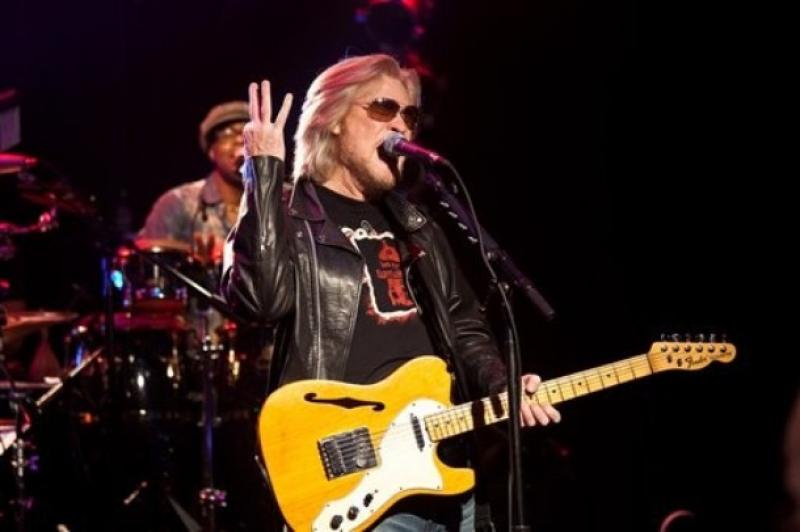
When he joined up with John Oates, Daryl Hall became half of one of the most successful duos in pop history, which has sold upwards of 60 million albums. From the mid-Seventies to the late Eighties, the pair notched six platinum albums and posted a remarkable streak of hit singles.
Born in Pottstown, Pennsylvania in October 1946, Hall majored in music at Philadelphia's Temple University, where he first met Oates. It was also in Philadelphia that he served a priceless musical apprenticeship with producers Kenny Gamble and Leon Huff, who were credited as architects of the Philly Soul sound, and he later played on sessions for the Stylistics, the Delfonics and the Intruders. Once launched as Hall & Oates, the pair (managed by future music mogul Tommy Mottola) signed initially to Atlantic, but didn't start to hit their commercial purple patch until they switched to RCA in 1975.
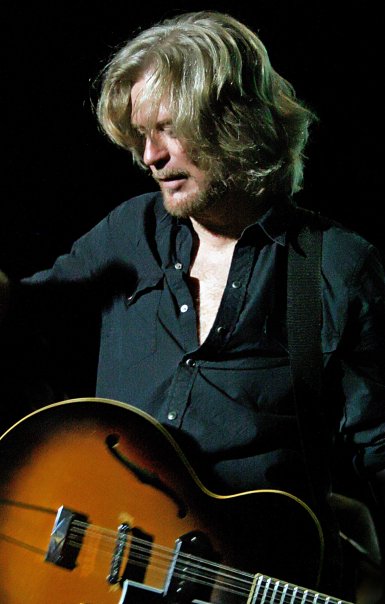 Hall began to step out on his own in 1980, when he released his first solo album Sacred Songs, which was followed by Three Hearts in the Happy Ending Machine, Soul Alone and Can't Stop Dreaming. His latest disc, Laughing Down Crying, was released in the UK this week. Meanwhile Hall has been enjoying a blast of revived credibility via his internet music show, Live from Daryl's House, where he mixes up his own material with music from a broad cross section of guests, from Smokey Robinson and Todd Rundgren to Jason Mraz, Diane Birch and Cee Lo Green. "When I started out as a kid I always wanted to be one of those people like BB King or James Brown, who we looked up to and who crossed generations," he says. "Luckily I think I'm starting to be able to do that."
Hall began to step out on his own in 1980, when he released his first solo album Sacred Songs, which was followed by Three Hearts in the Happy Ending Machine, Soul Alone and Can't Stop Dreaming. His latest disc, Laughing Down Crying, was released in the UK this week. Meanwhile Hall has been enjoying a blast of revived credibility via his internet music show, Live from Daryl's House, where he mixes up his own material with music from a broad cross section of guests, from Smokey Robinson and Todd Rundgren to Jason Mraz, Diane Birch and Cee Lo Green. "When I started out as a kid I always wanted to be one of those people like BB King or James Brown, who we looked up to and who crossed generations," he says. "Luckily I think I'm starting to be able to do that."
ADAM SWEETING: When you were growing up in Philadelphia, did you hear a mixture of music as well as just soul?
DARYL HALL: It was a combination. Geographically Philly is the southernmost northern city, so you got the influx of southern R&B and even Appalachian music, bluegrass kinda thing, all coming together with classical music because it was also a very cultured place. This filtered into the school system and into what you hear in the air of a city, all the different kinds of musicans, so it really all came together at that period to form a sound. Even before the late Sixties when I started with Kenny and Leon and Tommy Bell and all those people, there was a tradition there. There was [Philadelphia record company] Cameo-Parkway, Chubby Checker, Bobby Rydell, all that kind of music that preceded us. Look at the Twist and all that stuff. I was lucky enough to be exactly of the right age, and we all started together really.There was never a problem of me being white and working with black musicians. Philly's a very racially integrated city, always has been.
The first couple of Hall & Oates albums for Atlantic were produced by the great Arif Mardin. What did you learn from him?
That was amazing. He taught me how to be a producer. I learned from Kenny and Leon and all those guys how to be a writer, but Arif was just one of those people. He could take any kind of music, everything from Aretha Franklin to John Prine, and figure out what their essence was and make it sound great by adding just the right touches to it. That's how I learned to be fluent in different musical languages. Arif took me from straight R&B and put me into a world that was bigger than that, and showed me how to interact with that and produce it and arrange it and understand the best of it all. I loved Arif, he was a great man. I'm a real sponge, I was sucking it all up man, learning as much as I could. I still try and learn as much as I can.
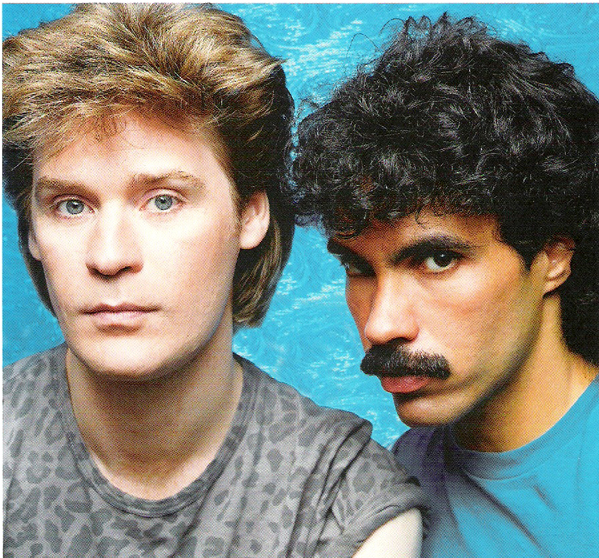 Did you initially want to be a solo artist, or in a band? I can't imagine you set out to be in a duo (Hall with John Oates in their pop star heyday, pictured left).
Did you initially want to be a solo artist, or in a band? I can't imagine you set out to be in a duo (Hall with John Oates in their pop star heyday, pictured left).
It's a funny thing, I never thought about it. I always considered myself a solo artist even during all the years with John, I felt we were two solo artists that were working together. We always tried to emphasise that concept because there's a thing with duos. Our touring company is called Two Headed Monster and that's what people try and do to you. Everything is a reaction against the other guy - "how does John feel about what you're doing?" or "you're the tall one as opposed to the short one". I'm just a one, but you're always being compared to the person standing next to you and I think that's very frustrating. Duos are a very strange breed and they usually don't last very long, or if they last they usually hate each other. That's not the case with me and John at all. We've learned to deal with it and we treat ourselves as individuals. We still tour together but he's out there working on his own, he just came back from his own world tour and I'm doing what I do. Occasionally we come together because we love playing the songs we did together on record, so there it is.
What kept you together for so long?
We both had similar beginnings... it's hard to say. We both liked the same kind of music, we have similar personalities, we grew up in the same area, we were friends before we were musical partners, so all these things I believe made it easy for us to stay together. And then of course we stayed together because we were thrown together, and it became a brand. You get locked into that.
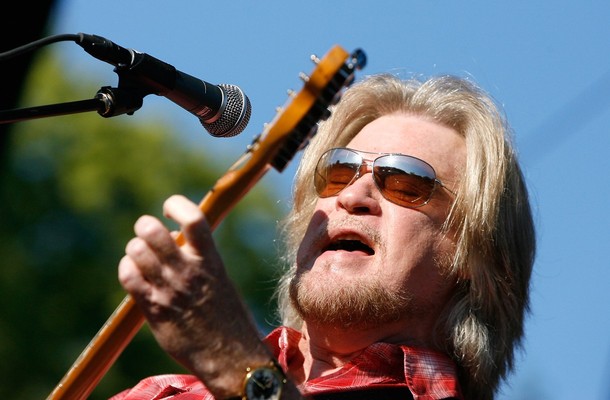 You're having great success with the Live from Daryl's House webcasts. How much has technology changed the way you write and record?
You're having great success with the Live from Daryl's House webcasts. How much has technology changed the way you write and record?
Well not really that much. I've always written from the heart and I think if Daryl's House has changed anything, it's made me even more direct, because when we're throwing all these things together it's all about the moment. It's live, it's unrehearsed, it's very spontaneous. I try to bring that into not so much my writing, but into the recording process. I try to make it quick and a little less thought out, although I never really thought it out a lot. Sometimes I have dense production on a record, sometimes less so. I think now I'm more in the sparse world, because I think what I do on the new CD is a lot like what I do with the Daryl's House band.
Appearing on MTV was very important to the success of Hall & Oates in the Eighties, wasn't it?
Sure, yeah. I wouldn't call Daryl's House coming full circle, but I learned so much from those days because they were trying to make something out of nothing. Nobody had ever done it before, and when I was involved with MTV the most it was really those early days. When people would just get in a room and say, "Okay you've got three hours, just do something." They didn't have scripts, they didn't have anything. They'd say to me and John, "Okay here's a selection of videos, we're gonna play them, just talk," and that's what we would do. We would cook eggs, I'd play the trombone, anything that would fill time really. It had that early-days energy and I think I learned from that, how to deal with things on the spot. That was MTV at its best. It was a completely new frontier at that time.
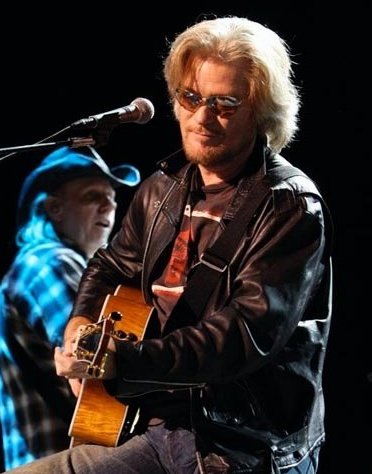 But MTV left certain images of you that lingered on, and not always in the most flattering way.
But MTV left certain images of you that lingered on, and not always in the most flattering way.
Oh yeah. The thing I didn't like about MTV was that what it was all about ultimately was these videos. The problem was, music shouldn't be given to people who aren't musicians to interpret. It's fine to watch a live performance, but as soon as you start getting these wannabe Cecil B DeMilles in there, y'know, guys that did a couple of commercials and think they're some kind of big-budget film directors, it gets out of hand. I'm not a big fan of Eighties music videos, personally.
The terms Soul and R&B mean something different now to what they did 30 years ago, don't they?
Well they mean the same thing to me as they always did, because I am of that. Unlike many people, I didn't learn from it, I am it, y'know. I grew up in it. Soul is a state of mind, I've said that a thousand times. It's really not about style or ... it's either real or it's not. If it's from the heart and it's got that soul kind of energy, it doesn't really matter what the instrumentation is or any of those kind of things. I think people confuse the trappings of soul with soul. They think because it might be a black girl or black guy singing something with a certain kind of beat that it's soul music, but that doesn't make it soul music. What's real is soul music, and that never changes.
Have you been invited to appear on American Idol or other reality music shows?
That's a different world, it really is. I've been on American Idol but it's not what I'm all about. The ironic thing is I've never really been interested in pop culture. I love music and I am - or was - sort of an accidental pop star but it wasn't something I was that interested in or continue to be interested in. I think it's valid and important to a lot of people but it's not really where I'm coming from. I look at music in a more pure sense.
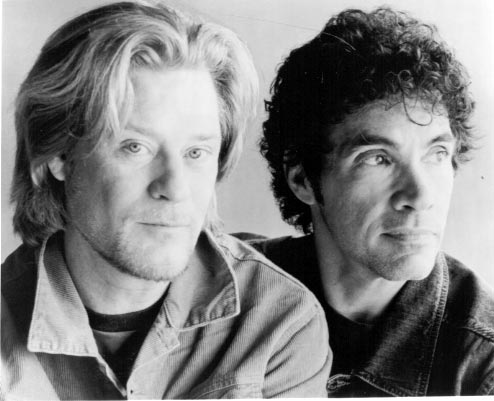 Is it important to be able to play an instrument and not just use computers and music software?
Is it important to be able to play an instrument and not just use computers and music software?
I think it's ultimately important. Excellence at your craft is always going to help you. You can get by without doing any of those things, but you're going to get by in a bigger way if you know how to do it (the latterday Hall & Oates, pictured right). There's no substitute for being good at what you do, there just isn't, because you'll be limited otherwise. The less you can do, the more you have to rely on other people. If you're playing live you have to be able to pull it off. You've still got to stand on stage and you have to be able to play an instrument and sing or do something if you want to have any kind of longterm career.
- Daryl Hall plays at the Latitude Festival in Suffolk today (14 July). Watch his music webcasts at www.livefromdarylshouse.com
Watch video of Hall performing 'I Can't Go For That' with Cee Lo Green
Explore topics
Share this article
Add comment
The future of Arts Journalism
You can stop theartsdesk.com closing!
We urgently need financing to survive. Our fundraising drive has thus far raised £49,000 but we need to reach £100,000 or we will be forced to close. Please contribute here: https://gofund.me/c3f6033d
And if you can forward this information to anyone who might assist, we’d be grateful.

Subscribe to theartsdesk.com
Thank you for continuing to read our work on theartsdesk.com. For unlimited access to every article in its entirety, including our archive of more than 15,000 pieces, we're asking for £5 per month or £40 per year. We feel it's a very good deal, and hope you do too.
To take a subscription now simply click here.
And if you're looking for that extra gift for a friend or family member, why not treat them to a theartsdesk.com gift subscription?
more New music
 Ireland's Hilary Woods casts a hypnotic spell with 'Night CRIÚ'
The former bassist of the grunge-leaning trio JJ72 embraces the spectral
Ireland's Hilary Woods casts a hypnotic spell with 'Night CRIÚ'
The former bassist of the grunge-leaning trio JJ72 embraces the spectral
 Lily Allen's 'West End Girl' offers a bloody, broken view into the wreckage of her marriage
Singer's return after seven years away from music is autofiction in the brutally raw
Lily Allen's 'West End Girl' offers a bloody, broken view into the wreckage of her marriage
Singer's return after seven years away from music is autofiction in the brutally raw
 Music Reissues Weekly: Joe Meek - A Curious Mind
How the maverick Sixties producer’s preoccupations influenced his creations
Music Reissues Weekly: Joe Meek - A Curious Mind
How the maverick Sixties producer’s preoccupations influenced his creations
 Pop Will Eat Itself, O2 Institute, Birmingham review - Poppies are back on patrol
PWEI hit home turf and blow the place up
Pop Will Eat Itself, O2 Institute, Birmingham review - Poppies are back on patrol
PWEI hit home turf and blow the place up
 'Fevereaten' sees gothic punk-metallers Witch Fever revel in atmospheric paganist raging
Second album from heavy-riffing quartet expands sonically on their debut
'Fevereaten' sees gothic punk-metallers Witch Fever revel in atmospheric paganist raging
Second album from heavy-riffing quartet expands sonically on their debut
 theartsdesk Q&A: Soft Cell
Upon the untimely passing of Dave Ball we revisit our September 2018 Soft Cell interview
theartsdesk Q&A: Soft Cell
Upon the untimely passing of Dave Ball we revisit our September 2018 Soft Cell interview
 Demi Lovato's ninth album, 'It's Not That Deep', goes for a frolic on the dancefloor
US pop icon's latest is full of unpretentious pop-club bangers
Demi Lovato's ninth album, 'It's Not That Deep', goes for a frolic on the dancefloor
US pop icon's latest is full of unpretentious pop-club bangers
 Yazmin Lacey confirms her place in a vital soul movement with 'Teal Dreams'
Intimacy and rich poetry on UK soul star's second LP
Yazmin Lacey confirms her place in a vital soul movement with 'Teal Dreams'
Intimacy and rich poetry on UK soul star's second LP
 Solar Eyes, Hare & Hounds, Birmingham review - local lads lay down some new tunes for a home crowd
Psychedelic indie dance music marinated in swirling dry ice
Solar Eyes, Hare & Hounds, Birmingham review - local lads lay down some new tunes for a home crowd
Psychedelic indie dance music marinated in swirling dry ice
 The Lemonheads' 'Love Chant' is a fine return to form
Evan Dando finally gets back in the saddle with an album of new tunes
The Lemonheads' 'Love Chant' is a fine return to form
Evan Dando finally gets back in the saddle with an album of new tunes
 Music Reissues Weekly: Evie Sands - I Can’t Let Go
Diligent, treasure-packed tribute to one of Sixties’ America’s great vocal stylists
Music Reissues Weekly: Evie Sands - I Can’t Let Go
Diligent, treasure-packed tribute to one of Sixties’ America’s great vocal stylists
 'Deadbeat': Tame Impala's downbeat rave-inspired latest
Fifth album from Australian project grooves but falls flat
'Deadbeat': Tame Impala's downbeat rave-inspired latest
Fifth album from Australian project grooves but falls flat

Comments
I am very persistent and